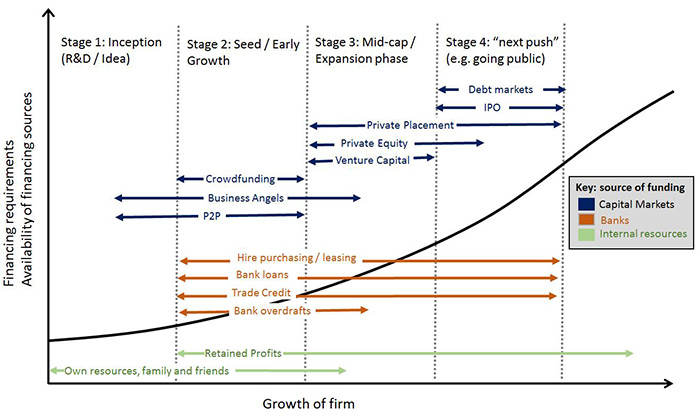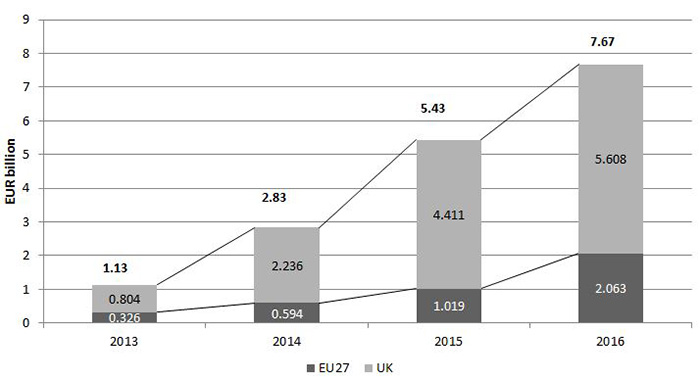Crowdfunding

Related topics
Crowdfundingdate: 27/03/2018
Start-ups and other SMEs often struggle to find financing in the early stages of setting up a business or when expanding. Traditional funding channels, such as bank loans, can be prohibitively expensive. The resulting shortage of money at such a crucial moment frequently seals the fate of a new, promising company. Crowdfunding offers a way to help SMEs grow enough to be able to access other sources of financing. For this reason, the European Commission on 8 March put forward new rules to help crowdfunding platforms scale-up across the EU's single market. This in turn should allow more European businesses and investors to benefit from the opportunities offered by crowdfunding.
Unleashing the crowdfunding potential
Crowdfunding is an innovative funding tool that allows entrepreneurs to make an "open call" to the wider public to get financial support for a specific business project. This is generally done through an internet-based platform. The Commission's proposal covers two popular crowdfunding models targeted at providing finance for early stage businesses – investment based and lending-based crowdfunding. These two models give promise of a financial return for investors through equity, bonds or similar financial instruments issued by the company. Crowdfunding can help young companies grow and develop, to a stage where they are able to access other sources of financing (such as venture capital). This helps fill the gap in the "funding escalator" that early stage or scale-up businesses currently face (see Fig. 1).
Fig 1 - funding escalator
Source: Commission services
Overall, crowdfunding in the EU is underdeveloped compared with other major world economies. But it is steadily growing and establishing itself as a tool for early-stage business finance (see Fig. 2).
Fig 2 - alternative finance market volume in the EU
Source: Reports by Cambridge Centre for Alternative Finance
However, crowdfunding has caught on at very different rates across the EU. While in some countries, such as France, Germany and the U.K., the alternative finance sector has grown considerably, in others it remains extremely small.
One of the biggest hurdles is the lack of common rules across the EU. This makes it difficult for crowdfunding platforms to expand across borders. As a result, the crowdfunding industry cannot fully exploit the benefits of the single market. And investors and entrepreneurs based in smaller countries are missing out on a valuable investing/financing tool as well as opportunities for diversification.
What is the Commission proposing?
The proposal the Commission is putting forward will make it easier for crowdfunding platforms to operate across Member States. This will widen the pool of investors. It will also enhance the ''network effects'' within platforms. This is because there will be more projects to choose from, allowing investors to diversify their investments. Furthermore, entrepreneurs will find it easier to raise funds in a bigger market and will even be able to choose from more investors who can also contribute to the management of the company.
The Commission's proposal introduces an optional EU regime that enables crowdfunding platforms to easily provide their services in the European single market. Instead of having to comply with different national legislation and therefore apply for separate licenses, platforms will only have to comply with one set of rules when operating across the EU. For investors, the proposal will provide a reliable space for supporting innovative projects. Clear and transparent rules will mean they are aware of risks, while having the freedom to easily invest in companies they want to support.
The Commission's proposal in a nutshell…
- establishes a one-stop-shop access to the EU market and therefore helps crowdfunding platforms overcome the barriers they face operating cross-border;
- provides tailored rules for EU crowdfunding services providers covering both investment-based and lending-based business models;
- gives more opportunities to EU investors while safeguarding a high level of investor protection in relation to crowdfunding services;
- defines the requirements crowdfunding service providers have to fulfil in order to get authorisation and provides a single point of entry for authorisation and supervision by a single authority, the European Securities and Markets Authority (ESMA).
Read more on crowdfunding


